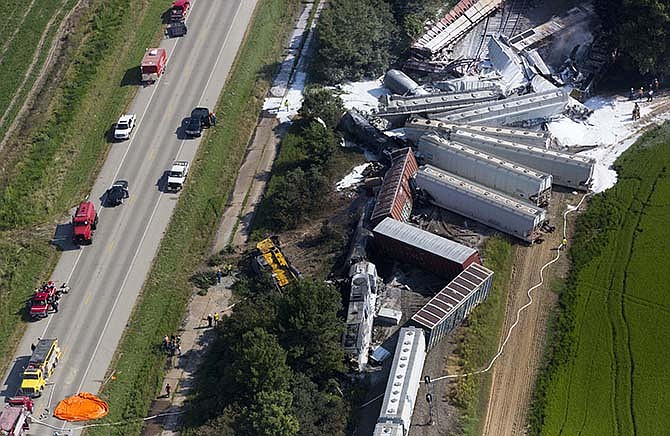JEFFERSON CITY, Mo. (AP) - Railroads have been hauling more than a dozen trains weekly through Missouri carrying volatile crude oil from the Northern Plains that's been involved in multiple fiery accidents, according to railroad disclosures released Thursday.
Details on the shipments were released in response to a public records request by The Associated Press.
Union Pacific hauls about 10 oil trains weekly through southeastern Missouri, according to the documents. Each carries at least 1 million gallons of oil and passes through three counties.
BNSF Railway is the other major hauler, with shipments through 34 Missouri counties. Some of those counties have had up to nine oil trains in a week. During other weeks, they've had no trains.
BNSF also reported moving oil trains through heavily populated St. Louis and Jackson counties. Jackson County includes Kansas City.
Kansas City Southern Railway Co. said it anticipated moving up to one train a week or five a month on a southbound route starting in Kansas City and ending in Nederland, Texas.
Federal officials ordered railroads to turn over details of the shipments to states after a string of accidents involving oil from the Bakken region of North Dakota, Montana and parts of Canada.
Before the Bakken began booming about five years ago, very little oil moved by rail in the U.S. It's since become commonplace, and derailments of Bakken tank cars have caused explosions in North Dakota, Virginia, Alabama, Oklahoma and Quebec, where 47 people were killed when a runaway train exploded in the city of Lac-Megantic in July 2013.
Details on the shipments in Missouri have been posted to a secure website used by local emergency officials to plan for potential accidents, said Mike O'Connell with the Missouri Department of Public Safety.
In response to the recent accidents, railroads have slowed down oil trains through cities and taken other steps to improve safety. But the industry's critics in Congress have said that's not enough and are pushing for tighter regulations.
New rules to strengthen rail cars that haul crude and other flammable liquids are pending.
Railroads have tried to shield information about the shipments from broader disclosure in Missouri and other states, citing security and business confidentiality.
Some states have agreed to withhold the information from the public.

